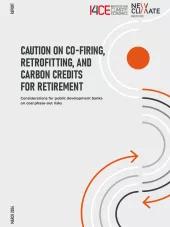This report was co-written by NewClimate Institute and the Institute for Climate Economics (I4CE).
Limiting global average temperature rise to 1.5°C requires stopping the construction of new coal power plants, and that many existing plants must retire early before the end of their technical lifetimes. This presents a major challenge as coal supplied more than one-third of global electricity generation in 2023. Several barriers to the phase-out of existing plants prevent market forces in favour of renewables and limit sustainable development gains.
Policymakers and public development banks are actively exploring strategies to accelerate the retirement of existing coal plants, extending beyond the exclusion of coal from direct financial support. With the support public development banks can provide, from advisory services and technical assistance to different forms of financing, they are uniquely positioned to help address barriers and support countries with the transition to decarbonised electricity systems. Engagement may carry risks of unintended adverse impacts, such as indirectly supporting new natural gas capacity. Other forms of engagement, such as transition finance and compensation payments, may also present unique risks depending on how they are used, ranging from moral hazard and inefficient utilisation of public funds to setting perverse incentives, which could impede coal phase-out.
The report reviews public development banks' instruments to help address barriers and the associated challenges and risks, including cases on existing phase-out engagements. It underscores the importance of seeking firm commitments from partner country governments and other stakeholders to stop future fossil fuel investments, shrink current pipelines to avoid emission leakage and moral hazard risks, and prevent backtracking on coal phase-out in the event of political turnover.
Instruments are explored according to the stakeholders that public development banks may engage with, considering their different roles in the power system: national policymakers, utilities, and independent power producers (IPPs).
When engaging with national governments, public development banks should:
- Assist countries in defining ambitious, Paris-aligned long-term low-emissions development strategies before engaging stakeholders on coal phase-out, ensuring alignment between early retirement efforts and long-term strategies.
- Assist governments in building capacity to set coal phase-out targets and plan and implement early retirement of coal-fired plants (e.g., through knowledge sharing, targeted technical assistance, and initiatives supporting just transition planning).
- Provide financial support, for example, through policy-based lending and technical assistance to support ambitious energy policy and institutional reforms.
- Support the issuance of sustainability-linked sovereign bonds that contribute to transforming local economies towards low-emissions and climate-resilient systems.
- Look to increasingly engage with national development banks to facilitate the transition from coal.
When engaging with utilities, public development banks should:
- Not pursue buyouts of coal plants at the asset level but instead support utilities in changing their business model to enable them to attract private capital to finance renewable energy.
- Avoid moral hazard and ensure transition aligns with climate objectives by defining ambitious key performance indicators and addressing potential loopholes that may lock in business-as-usual pathways.
- Continue to focus on efforts to finance the win-wins of renewable energy, energy storage, and smart grids, as well as supporting decommissioning and remediation.
When engaging with IPPs, public development banks should:
- Only consider buying out IPPs under very limited circumstances (i.e., when there is a government commitment to coal phase-out to avoid emission leakage).
- Facilitate legal review of power purchase agreements (PPAs) and support innovative financing mechanisms to terminate, replace, and potentially restructure PPAs.
- Engage and incentivise more ambitious commitments, including through transparent and competitive market mechanisms, to overcome information asymmetry and ensure public funds are used efficiently.
This report may be read in conjunction with a separate publication, Caution on co-firing, retrofits, and carbon credits for retirement: considerations for public development banks on coal phase-out risks.







